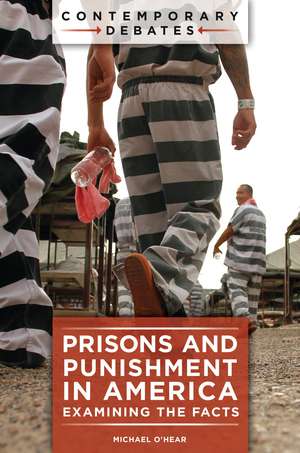Prisons and Punishment in America: Examining the Facts: Contemporary Debates
Autor Michael O'Hearen Limba Engleză Hardback – 13 sep 2018 – vârsta până la 17 ani
Din seria Contemporary Debates
- 11%
 Preț: 345.90 lei
Preț: 345.90 lei - 43%
 Preț: 273.55 lei
Preț: 273.55 lei - 43%
 Preț: 274.02 lei
Preț: 274.02 lei - 50%
 Preț: 257.66 lei
Preț: 257.66 lei -
 Preț: 146.61 lei
Preț: 146.61 lei - 5%
 Preț: 140.96 lei
Preț: 140.96 lei - 42%
 Preț: 273.11 lei
Preț: 273.11 lei - 43%
 Preț: 268.84 lei
Preț: 268.84 lei - 42%
 Preț: 269.79 lei
Preț: 269.79 lei -
 Preț: 104.20 lei
Preț: 104.20 lei - 42%
 Preț: 270.72 lei
Preț: 270.72 lei - 42%
 Preț: 272.99 lei
Preț: 272.99 lei - 42%
 Preț: 269.60 lei
Preț: 269.60 lei - 41%
 Preț: 281.16 lei
Preț: 281.16 lei - 42%
 Preț: 271.68 lei
Preț: 271.68 lei -
 Preț: 250.02 lei
Preț: 250.02 lei -
 Preț: 269.79 lei
Preț: 269.79 lei - 42%
 Preț: 271.22 lei
Preț: 271.22 lei -
 Preț: 270.64 lei
Preț: 270.64 lei -
 Preț: 271.80 lei
Preț: 271.80 lei
Preț: 271.22 lei
Preț vechi: 519.88 lei
-48% Nou
Puncte Express: 407
Preț estimativ în valută:
51.91€ • 54.21$ • 43.04£
51.91€ • 54.21$ • 43.04£
Carte tipărită la comandă
Livrare economică 11-25 februarie 25
Preluare comenzi: 021 569.72.76
Specificații
ISBN-13: 9781440855429
ISBN-10: 1440855420
Pagini: 256
Dimensiuni: 156 x 235 x 18 mm
Greutate: 0.57 kg
Editura: Bloomsbury Publishing
Colecția ABC-CLIO
Seria Contemporary Debates
Locul publicării:New York, United States
ISBN-10: 1440855420
Pagini: 256
Dimensiuni: 156 x 235 x 18 mm
Greutate: 0.57 kg
Editura: Bloomsbury Publishing
Colecția ABC-CLIO
Seria Contemporary Debates
Locul publicării:New York, United States
Caracteristici
Reveals the subtle connections between different aspects of the criminal justice system that are often missed in policy discussions
Notă biografică
Michael O'Hear is professor of criminal law and procedure at Marquette University Law School. His books include The Failure of Sentencing Reform and Wisconsin Sentencing in the Tough-on-Crime Era.
Cuprins
How to Use This Book1 American Sentencing-Law and PracticeQ1. Have judges lost their sentencing discretion?Q2. Do modern-day prosecutors dictate sentences for criminal convictions?Q3. Are defendants punished for exercising their constitutional right to a trial?Q4. Do drug offenders get tougher sentences than violent offenders?Q5. Do white-collar criminals ever get serious prison terms?Q6. Is capital punishment "dead" in the United States?Q7. Are the needs and wishes of crime victims disregarded in the sentencing process?2 Alternatives to IncarcerationQ8. Is probation just a "slap on the wrist"?Q9. Are so-called intermediate sanctions more effective in reducing recidivism than traditional probation?Q10. Do drug treatment courts and other problem-solving courts really work?Q11. Does restorative justice really work?Q12. Are colonial-style "shaming" sentences an appropriate alternative to incarceration?Q13. Have fines and other financial penalties in criminal cases dramatically increased since the late 1990s?3 The Experience and Consequences of IncarcerationQ14. Has imprisonment in the United States gotten too soft?Q15. Do judges play a significant role in the administration of prisons?Q16. Does time in prison leave inmates more likely to reoffend?Q17. Do prisoners have opportunities to work, learn, or otherwise spend their time productively during incarceration?Q18. Are incidents of violence against inmates and coerced sex common occurrences in prisons?Q19. Do prisons use solitary confinement too much?Q20. Do private prisons deliver better results at lower cost than public prisons?Q21. Are children harmed by the incarceration of a parent?4 Release and Life after PrisonQ22. Can prisoners still accelerate their release through good behavior and rehabilitative progress?Q23. Given the high recidivism rate of released prisoners, shouldn't they be held behind bars as long as possible?Q24. Is it possible for former prisoners to reintegrate fully into society and live a normal life?Q25. Are most parolees returned to prison for technical violations?5 Women, Juveniles, and Other Special Offender PopulationsQ26. Do female offenders receive preferential treatment when it comes to sentencing and corrections?Q27. Does the system really hold juveniles accountable for their crimes?Q28. Are mentally ill offenders able to get the treatment they need through the criminal justice system?Q29. Do registration, community notification, residency restriction, and civil commitment laws help to reduce the threat posed by sex offenders after their prison terms are completed?Q30. Should elderly, disabled, and chronically ill prisoners be given "compassionate release"?6 Causes and Significance of "Mass Incarceration"Q31. How does the U.S. incarceration rate compare to international and historical norms?Q32. Did the War on Drugs cause mass incarceration?Q33. Has mass incarceration helped to reduce crime?7 Race, Ethnicity, and PunishmentQ34. Are African Americans incarcerated disproportionately in the United States?Q35. What causes the disproportionate imprisonment of African Americans?Q36. Are there other racial or ethnic groups who experience disproportionate incarceration?Q37. What should be done to address racial disparities in incarceration?8 Public Opinion, Politics, and ReformQ38. Does public opinion always favor tougher punishment?Q39. Are the fiscal burdens of mass incarceration changing the politics of punishment?Q40. What reform measures might best reduce excessive incarceration?IndexAbout the Author
Recenzii
The first page of this book clearly defines its intended audience and that of the other Contemporary Debates volumes: 'high school and undergraduate students as well as members of the general public.' That clearly designates the kinds of libraries that will benefit most from adding this title to their collections. This series has examined other topics of current interest: climate change, the Affordable Care Act, Muslims, marijuana, journalism and 'fake news,' and immigration. These other books should be of similar interest to libraries considering this one.
